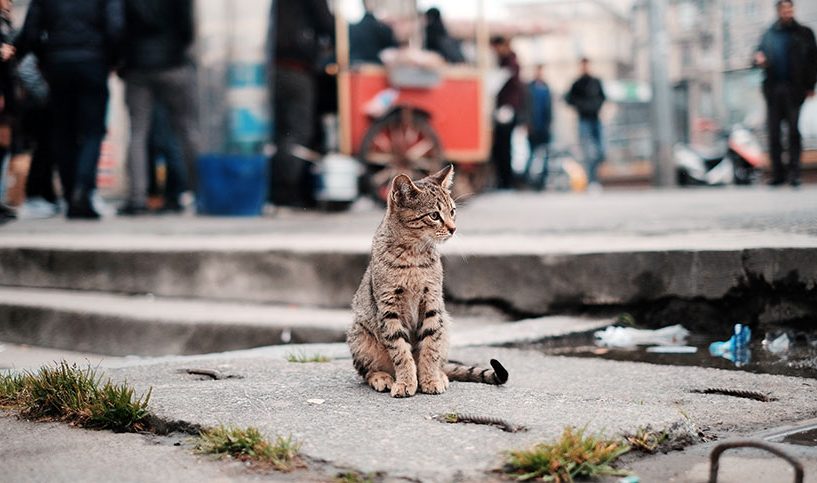They find an empty table for two, he on one side, she on the other. It is the weekend and the young mother and father have found a table outside, among the palms, in the early morning harbor air, and almost immediately he does two things: lights a cigarette and looks long and hard into the cellphone he carries in his left hand; and although she does not smoke, she, too, takes out her handy machine from her purse and stares intently into it. Meanwhile, their maid, not to mention their three-year-old son, have not stopped walking along the harbor edge, looking down at the silver flicker of tiny fish. The boy laughs at this, pointing, saying something the maid can only nod to. It isn’t long before the boy loses interest in the fish and makes for the many pigeons tick-tocking down the walkway, as if cobblestones were their idea. And of course, it is not the maid’s duty to say he can’t scare pigeons into the palm trees.
Back to the young couple who have now ordered their food and seeing that the maid with son are in shouting distance, the mother returns to her machine, even pushing a button or two, which causes her to smile. They are both tired from a long week of work and this is their time to relax with their son, to enjoy the morning. When the maid and son make their way to the table, he does his best to tell Mom and Dad all about the birds and fish and sailboats, and the mother waits for him to finish before saying, “That’s fine.”
By now the maid tells the son it is time to eat and after she arranges him in the chair just right, she helps him plunge a straw into his chocolate milk while cutting pieces of pancake to slowly deliver into his open mouth. Moments later, forgetting all about the pancake and chocolate milk he has yet to swallow, he suddenly twists around to watch one of the harbor cats lurking nearby.
After a kind of breakfast, the maid with three- year-old son cannot help but return to watch the fish, with him deciding to scatter pebbles as he goes. Meanwhile, the young mother and father are talking now, and part of their talk has to do with children, how they are thinking of having another child. It is time for another child. In the end they both agree. Before returning to poke at their machines, he lights another cigarette while she turns to ask the son, who is no longer there, “And how was your pancake?”
Because it is a sticky and warm, they roll out one of the big fans to place near their table. And so there they are: three women, sunglasses neatly positioned atop hijabs, outside under the palms, enjoying the harbor, chatting, eyeing their cellphones, minding their own business, when suddenly, just when all seems correct, the threesome squeal and jump up, knocking over chairs and assorted coffee cups, not to mention ripping a hole in the quiet harbor morning. The three women scatter in three different directions.
Of course, I jump up, too, we all do, thinking snakes, spiders, rats, rape, mayhem. The three of them, now safely away from their table, slowly, come together, one, hand covering her mouth, another hands-on hips, the third squatting to get a better looksee at the table with overturned chairs. And when I turn to look, ready for something terrible, all I see is one of those scrawny harbor cats sitting in a nonchalant catty way, looking hard at me as if to say, “What?”
Because she is in a big rush, she doesn’t just push the baby carriage but drives it. I can see her coming from a longway off, as she weaves around walkers and talkers, assorted joggers, steering the carriage around a cluster of palms and potted plants. She is looking directly at me, if not at me then at the empty table next to me, her destination. As she navigates the carriage through the maze of chairs and tables, I can see an easier route, a less zig-zagging way, but never mind because she hasn’t taken her eyes off the empty table, as if someone will grab it at any moment no matter how hard she tries, like swimming upstream.
Her face grows red, redder and so, in the end, she does something like a bulldozing as she scrapes chairs and tables out of the way, and just when she thinks she is through the clog of tables and safely onto the harbor walkway, her buggy catches the edge of a table, and the man’s coffee cup storms, as a tiny brown coffee-wave rolls across the tabletop and into his lap. He jumps up, glaring at her, and the best she can do is stop, reconsider and say, “What are you looking at?”
When she finally arrives, she parks one of the carriage wheels on my foot before she plops down in a chair. Because baby carriage wheels are not heavy, I think nothing of it and easily lift it off and when I do she says ‘Sorry’ but it is hard to tell if she is speaking to me because she is looking down at her hands. That is when I can see that the baby carriage is empty, baby-less, and when I look to see where her child can be, there is nothing.
No toddler chasing pigeons, no maid gently herding a child, nothing like a father. Her carriage parked, she reaches in to arrange a dirty blue blanket, tucking it neatly in here and there, smoothing it flat. I heard what she said to the man and prepare myself for her unhappiness, but surprisingly she turns to me like she had called this meeting, and thanks me for coming, and wonders “And how are you today?”
Photo by JC Bonassin and Emre Gencer on Unsplash.







